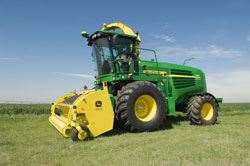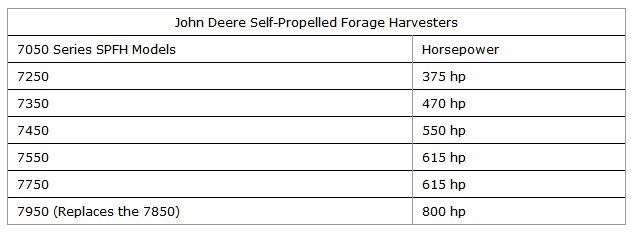
John Deere Introduces New 800-hp 7950 Self-propelled Forage Harvester
LENEXA, Kansas — John Deere introduces its new 800-hp 7950 Self-propelled Forage Harvester — the largest, most powerful SPFH the company has ever built. In addition, John Deere unveils its new 770 SPFH Corn Head, and 600C Series Pickup Heads to further complement the 7050 Series lineup.
The 7950 SPFH is now available to order and replaces the 7850 in John Deere's forage-harvester lineup that includes five additional models that range in size from 375 to 615 hp.
 "The 7950 SPFH is ideal for customers that require a large-capacity forage harvester for their dairy, beef, or custom-harvest operation. In some cases a single 7950 can replace two smaller forage harvesters. Customers that utilize one machine instead of two can significantly reduce their machinery and operator costs. And, thanks to its increased harvesting capacity, the 7950 SPFH increases productivity and reduces the number of hours or days it takes to harvest a crop," says Tim Meister, division manager of marketing, John Deere Ottumwa Works.
"The 7950 SPFH is ideal for customers that require a large-capacity forage harvester for their dairy, beef, or custom-harvest operation. In some cases a single 7950 can replace two smaller forage harvesters. Customers that utilize one machine instead of two can significantly reduce their machinery and operator costs. And, thanks to its increased harvesting capacity, the 7950 SPFH increases productivity and reduces the number of hours or days it takes to harvest a crop," says Tim Meister, division manager of marketing, John Deere Ottumwa Works.
The 7950 SPFH is available with John Deere HarvestLab™ and AutoLoc™ (Automatic Length of Cut) technology to help operators customize machine performance and maximize forage quality to best fit the field conditions at hand.
"With its 19L Cummins® engine, the 7950 SPFH provides customers with efficient power and reliability to handle their most demanding harvesting jobs, without compromising quality or performance," adds Meister.

Customers can now order the new John Deere 770 Corn Head that's compatible with the company's 7050 Series SPFHs. The 770 Corn Head is a 10-row unit on 30-inch spacing and can be a replacement for the 710 Corn Head. The new corn head is comprised of four large drums and two small drums. The large drums are especially beneficial for customers who need to harvest tall or high-tonnage corn.
"The larger 770 Corn Head utilizes the increased power levels of the 7950 SPFH to provide increased productivity for customers," says Meister.
Three new John Deere 600C Series SPFH Pickup Heads are also now available for use with 7050 Series SPFHs.
"These new heads offer customers improved efficiency and productivity and allows them to make fewer passes through the field to harvest the same amount of crop as before. We've also made several improvements to our new 600C Series Pickup Heads that make them considerably more durable and reliable than the 600B models that they replace," explains Meister.
Meister says these improvements include heavier drives, heavy-duty bearings in the pickup reel versus a bushing, redesigned side panels, and an improved PTO shaft cover. In addition, the number of chains that drive the head has been reduced by 50 percent.
"Several new options for the 600C Series are also available and include hydraulic-foldable gauge wheels, a redesigned roller-tine compression unit, a pivoting frame for the 630C, and a lifting of auger during reversing. These options let customers tailor the pickup head to best fit their operation," says Meister.

For more details you can visit with your local John Deere dealer, or go online and visit the company's web site at www.JohnDeere.com.
John Deere (Deere & Company — NYSE: DE) is a world leader in providing advanced products and services for agriculture, forestry, construction, lawn and turf care, landscaping and irrigation. John Deere also provides financial services worldwide and manufactures and markets engines used in heavy equipment. Since it was founded in 1837, the company has extended its heritage of integrity, quality, commitment and innovation around the globe.
Media Contact:
Barry Nelson, Mgr., Media & Channel Relations
Phone: 913-310-8324
E-mail: NelsonBarryE@JohnDeere.com
Eric Hodson, Sr. Writer, Public Relations
Phone: 913-310-8284
E-mail: HodsonEricS@JohnDeere.com